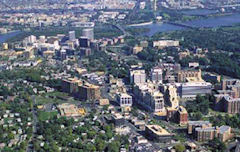by James A. Bacon
As regular readers of Bacon’s Rebellion should know by now, I am a philosophical conservative with a strong libertarian bent. I believe in smaller government, lower taxes, less regulation and stronger property rights. I regard the private sector, not the government, as the engine of economic progress. I regard social-engineering progressives with great suspicion. Yet…. I support Smart Growth. How is that possible?
I endeavored to answer that question in my previous post, “Smart Growth for Conservatives,” by articulating a vision for Smart Growth based on conservative principles.
Smart Growth, which I define as efficient human settlement patterns, is neither an inherently liberal nor an inherently conservative idea. Efficiency is efficiency. Cost effectiveness is cost effectiveness. The problem is that liberals (progressives, whatever you want to call them) were primarily the first to recognize the obvious truth that the settlement patterns we commonly refer to as “suburban sprawl” are very inefficient indeed. Unfortunately, liberals being liberals, they sought top-down, government-directed solutions. Then, conservatives, being allergic to government-led social engineering, reacted by dismissing Smart Growth as the spawn of the devil.
The logical, if somewhat extreme, outcome of the conservative dismissal of Smart Growth is the anti-Agenda 21 movement, which connects non-existing dots between the United Nation’s Agenda 21 sustainability agenda, President Obama’s green policies and efforts in Virginia’s cities and counties to implement Smart Growth. Thus, in this conspiratorial mindset, anything resembling Smart Growth is seen as part of a larger movement to undermine American freedoms and liberties. Frighteningly, this movement has gained momentum in a number of Virginia counties and created a distraction from the real issues.
The problem with the anti-Agenda 21 crowd — and conservative thinking on this topic generally — is that it ignores the very real problems caused by six decades of government planning, subsidies and intervention in transportation and land use. The dysfunctions we experience in suburbia — traffic congestion, pollution, rising cost of government services, over-dependence upon automobiles, with negative consequences for family finances and personal health — can be traced to governmental malpractice in the first place. Yet rather than acknowledge this congenial truth, conservatives, who supposedly believe in limited government, have managed to become champions of the statist status quo.
I find this just short of insane. If conservatives don’t like the liberal version of Smart Growth, that’s fine. I don’t agree with all of it either. (Actually, there is no Smart Growth orthodoxy, but a loose cluster of ideas, some calling for top-down action and some for bottom-up changes.) But don’t pretend the current situation doesn’t cry out for reform. Don’t defend the indefensible. Instead of just saying, “No,” articulate a conservative version of Smart Growth.
That is what I have tried to do. The feedback to my speech at the Congress for New Urbanism, from which my essay was adapted, has been positive so far. The essay represents no more than a primitive first step. It needs work. It delves only skim deep. But it’s a start.



